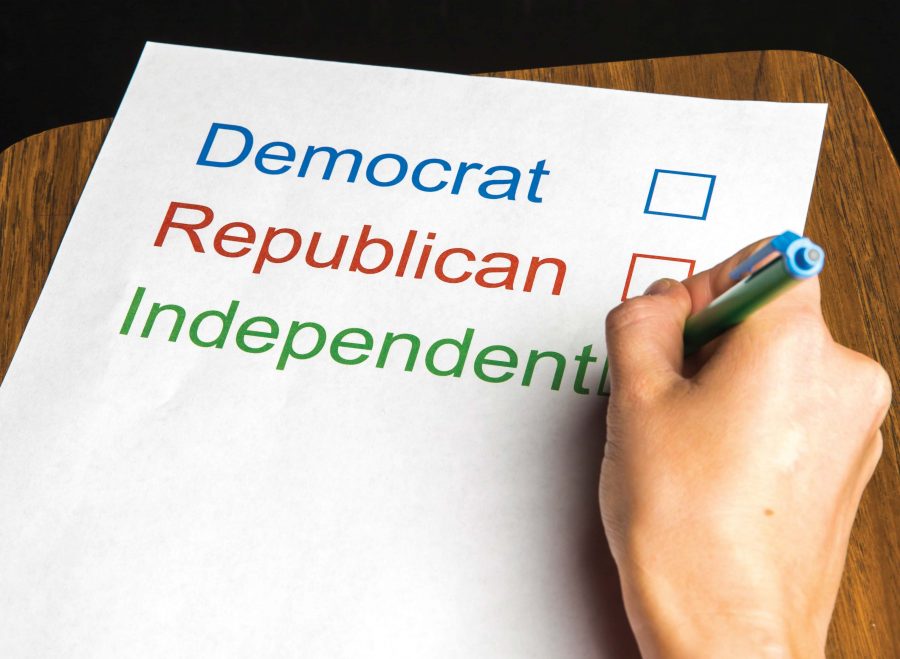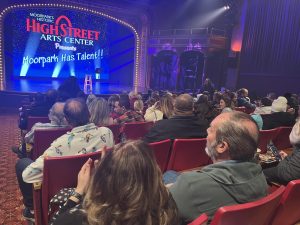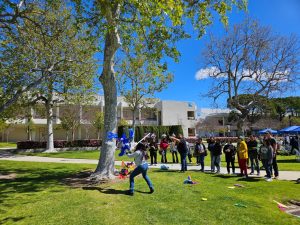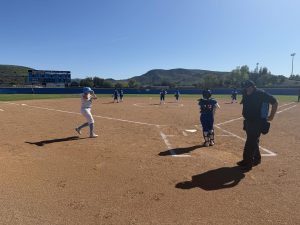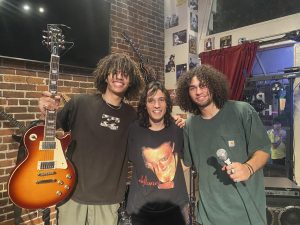Faculty and students respond to misleading political party’s name
Moorpark College students and faculty members have different opinions about the misleading name of the American Independent Party. Photo credit: Ryan Rocha
April 26, 2016
A poll conducted by the Smith Johnson Research and Tulchin Research in February suggests that the largest third party in California, the American Independent Party, might be that way by mistake.
The poll suggests that 73 percent of those who have registered to vote as members of the AIP may have joined thinking that by checking the box for “American Independent Party,” they were choosing to become independent voters, who are unaffiliated with any of the organized political parties, instead of joining a political party with old-fashioned values.
“That’s kind of shocking,” said Marilyn De Leon, 18, first-year Moorpark College student. “It’s probably because of their name, that’s why people are [choosing that political party], not really knowing what they really are and what they support.”
The AIP is a conservative party that opposed abortion, same-sex marriage and wishes to build a wall around the U.S., according to the party’s official website,
Steven Pfeffer, political science professor at Moorpark College believes that it is an understandable mistake to make, for the most part, because of the similarities in name and because mistakes such as this are easy to make while in a hurry.
“ … They’re not aware that the American Independent Party is a hard right conservative party and the majority of your independents are soft righties or soft lefties, so to find out that not only did they not register as independent, but also a hard right party, I’m not surprised,” Pfeffer said.
The correct choice for those hoping to register as an independent voter would be the “no party preference” box with a brief description of being unaffiliated and the possibility of being unable to vote in certain elections.
De Leon is also sympathetic toward those who have checked the wrong box. Though she is not among those who have made this mistake, she believes it would be easy to do so on accident.
“If I were to read that, I would probably go for it not knowing what it was,” she said. “Especially with the young adults, that’s probably the biggest problem.”
Patricia Colman, a history professor at the college, is somewhat less sympathetic towards those who choose the wrong party, believing it is clear enough to know the difference.
“People need to read better, because if you looked at it, it does say ‘Independent Party,’ ‘Democratic Party,’ and so on and it’s pretty obvious if you take the time to read something carefully,” Colman said. “To me, it kind of really speaks to the larger issue of people. You need to educate yourself, you need to be aware of the issues, be aware of the parties, and you need to be aware of the voter registration guide.”
Shannon O’Neill, 18, biology major, sees both sides of the issue, but ultimately agrees that those who are planning to register should know exactly what they are signing themselves up for first.
“People can’t blame a title for misleading them,” she said. “When it comes to something as important as voting, you should know exactly what you want when it comes to registering.”
Though Colman believes that the responsibility lies with the voter, she concedes that the party name may be somewhat unclear.
“Certainly, it could have been presented better,” she said. “They certainly could have had the ballot and voter registration format so much better, but I don’t think it was intentional.”
Though this all stems from an abundance of unfortunate mistakes throughout California, the fact that this issue is a concern on a college campus is something positive in its own right. Pfeffer said that his students and people all over campus have been abuzz with conversations about politics and the upcoming election, which is a positive thing.
“One thing that can be
optimistic about future generations—because they may not be reading newspapers,
but they are addicted to their tech, more millennials than you might think are
actually following politics through alternative sources,” Pfeffer said. “ …
It’s nice to see these younger voters turning out, whether or not I agree with
the Sanders or the Trump voters, I hope they’ll stay involved and I hope
they’re enjoying the presidential primary process.”

